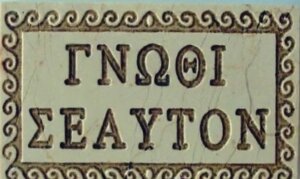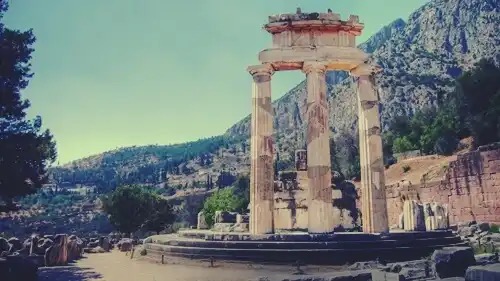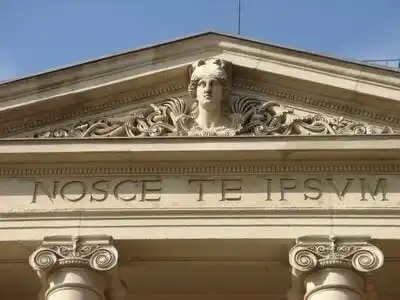The Origin of the Famous Saying "Know Thyself"


Written and verified by the psychologist Valeria Sabater
Know thyself. These were the words inscribed almost as a warning in the pronaos of the Temple of Apollo in Delphi. It was Plato who actually transmitted this phrase via his dialogues. Indeed, he suggested the importance of looking inwards before making any decisions or taking any steps forward.
Many centuries have passed since then. However, people still find themselves pretty helpless when it comes to self-knowledge. In fact, our society continues to act without reflecting first, blames others for its failures, and continues to behave without integrity.
For example, self-protective and rationalization biases abound. When you fail, you make an excuse. In fact, it’s always easier to hold others responsible for your own mistakes, to resort to the situational factor and say things like “It’s an impossible situation, there’s just no way out”.
Whether you like it or not, self-knowledge is the essence of human maturity. It’s your greatest responsibility, the task to which you should devote time, insight, and effort. In addition, you don’t need a trip to India or to walk the Camino de Santiago to enlighten yourself. As a matter of fact, you can get to know yourself in everyday life because self-knowledge is a daily undertaking.
As Thomas Hobbes rightly said, “Whosoever looketh into himself, and considereth what he doth, when he does think, opine, reason, hope, fear, etc, and upon what grounds; he shall thereby read and know, what are the thoughts, and passions of all other men”. In other words, knowing who you are doesn’t only help you, it helps you understand others as well.

Know thyself, a message from the gods
This message isn’t merely a simple piece of advice or recommendation. The words were written at the entrance to the Temple of Apollo in Delphi. However, they were meant to serve as an appeal or even a warning that went far beyond mere ethical or religious values. Pausanias, the famous traveler of the second century AD, stated in his work, Description of Greece, that the phrase on the temple was inscribed in gold.
The sibyls were wise women who’d trained since childhood to reveal the message of the oracles. In their room, the following inscription was written:
“I warn you, whoever you are, Oh! You who want to probe the “Arcana of Nature”, that if you do not find “within yourself” that which you are looking for, you shall not find it outside either! If you ignore the excellences of your own house, how do you pretend to find other excellences? Within you is hidden the treasure of treasures! “Know Thyself” and you will know the Universe and the Gods.”
The Oracle of Delphi, a place of pilgrimage
For several centuries, Delphi was the site to which several famous people traveled. These included Philip II, King of Macedonia, Pyrrhus, King of Epirus, Cicero, and Julian the Apostate. At 22,965 feet above sea level and 5.9 miles away from the Gulf of Corinth, it was a powerful place. It was there that the famous Oracle of Apollo stood. This was the place that any mortal could receive a message from the gods regarding their destiny.
The recorded works of Aeschylus, Cicero, Pliny, Plato, Pausanias, and Plutarch gave life to this setting which today only consist of some ruins at the foot of a mountain. These works tell of fountains and forests of laurel. They also tell of the pythonesses or priestesses of the temple who interpreted the messages offered by the gods.

The temple was erected in a place called Pytho. There was a great dragon there that, according to mythology, guarded the Oracle. Apollo killed the creature and took over the sanctuary. The Oracle of Delphi reached its peak in the seventh century BC. However, it lost importance in the times of the Roman occupation of Greece.
Before you ask a question, know thyself
The fact that the words “know thyself” were written at the entrance to the temple was no accident. Pliny said that it was impossible to cross the threshold without looking at these words inscribed in gold. Furthermore, he claimed they became imprinted on the mind. In fact, this was exactly what they were meant to do. They acted as a warning to people to reflect and be aware of the facts that:
- He who wanted the Oracle of Delphi to speak to them should first delve into themselves.
- From the knowledge of oneself, come the most accurate questions.
- No question makes sense if you don’t first answer the most important one: “Who are you?”
- Only those who are wise enough to understand each other in-depth will know how to make use of what the Oracle reveals to them.

The hard task of knowing yourself
Most of us understand that there are few messages as important as the one inscribed on the pronaos of the temple of Apollo. In fact, know thyself is the kind of message that abounds in any self-help book, philosophy manual, or Instagram story. No doubt you’ve heard it at some point, and you probably try to carry it out in your daily life.
As we mentioned above, this isn’t an ability you can acquire overnight. However, neither are any grand achievements required. In fact, it’s an ongoing adventure that lasts a lifetime. This is because you change over time. You mature, improve, and move forward.
As André Gide said in Autumn Leaves (1950) “A caterpillar who seeks to know himself would never become a butterfly”. Therefore, it isn’t a question of searching for yourself but finding yourself every day, of having clear needs, dreams, and the potential to improve.
This text is provided for informational purposes only and does not replace consultation with a professional. If in doubt, consult your specialist.








